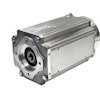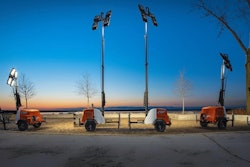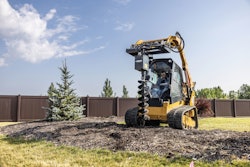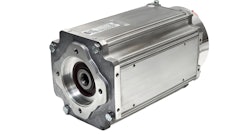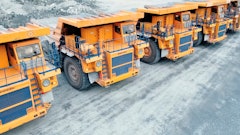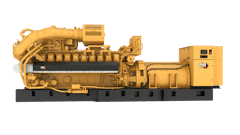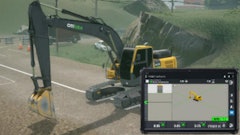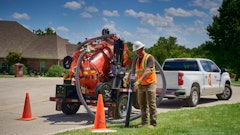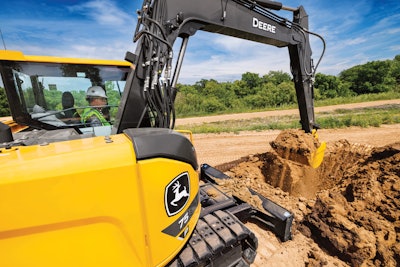
Seasonal changes bring increased temperatures and longer days, introducing challenges contractors and maintenance service providers must consider when purchasing and maintaining equipment, noted Christian Coulis, Milwaukee Tool senior vice president of product management. Summer months are usually the highest productivity months for the construction industry, especially for northern climates, noted Mike Fulton, John Deere service marketing manager. In addition, contractors should pay heed to high ambient temperatures and dust levels, said Will Molnar, Caterpillar product specialist, adding that mulching application debris can present a fire hazard.
Summer Equipment Prep
Jacob Sherman, product and dealer marketing manager at DEVELON, noted contractors and service techs face various equipment-related challenges when working during the hot summer months. High temperatures can lead to overheating and reduced equipment efficiency. They can also potentially cause damage to heavy equipment. In addition, extreme temperatures may lead to fuel issues, affecting engine performance, Sherman said.
“With increased ambient temperatures and an increase in machine usage during this time of the year, contractors and maintenance service providers need to be mindful of the higher productivity and heavy-duty cycles that impact their equipment,” Fulton said.
 Summer months are usually the highest productivity months for the construction industry, especially for northern climates.John Deere
Summer months are usually the highest productivity months for the construction industry, especially for northern climates.John Deere
Fulton said that this can be mitigated by draining water from the bulk fuel tanks and ensuring proper filtration to support machine longevity and less downtime. Consider fuel sample analysis from the bulk tank during this time of year to ensure that levels are appropriate for amplified operations, he added.
“With environmental challenges, routine summer maintenance of gas-powered engines becomes an important factor for operators to consider [to] maintain jobsite productivity,” Coulis said.
“Engine issues [because of] overuse and overheating can contribute to equipment downtime on a jobsite, impacting contractor productivity and efficiency. With heightened temperatures and longer days, contractors must regularly tune up their gas engines to properly maintain their equipment for maximum efficiency in application. Unlike gas-operated solutions, battery-powered equipment does not require routine maintenance, making summer challenges a thing of the past.”
Hot pavement accelerates tire wear and increases the risk of blowouts of wheel loaders and wheel excavators. Elevated temperatures can also impact the viscosity of hydraulic fluids and affect hydraulic system performance, Sherman noted.
“Summer construction can be dry and dusty, leading to increased debris accumulation in equipment,” Sherman said. “Increased humidity—depending on the region—during the summer months can contribute to corrosion and rust on the equipment.”
Sherman pointed out that high temperatures can lead to uncomfortable working conditions for equipment operators if they do not have an air-conditioned cab and proper air ventilation.
“Regularly service and maintain air conditioning systems, clean filters and address any issues promptly to avoid downtime,” he said. “It’s also a good idea to schedule breaks to avoid heat-related illnesses and ensure operators have access to water and proper ventilation.”
Molnar noted that, during equipment inspections, contractors should check for animals and bird’s nests.
“Not only can animals be harmed unintentionally, but nests can cause machine fires,” he said.
Keeping the windows and doors shut to prevent dust from entering the cab is important. Maintaining clean windows is important for safety, Molnar added.
Equipment owners and operators should diligently adhere to the maintenance interval schedule outlined in the manufacturer’s maintenance manual, Sherman noted.
“This habit is essential for minimizing excavator downtime,” he added. “Additionally, it is recommended to clean the machine regularly, particularly when performing service or maintenance procedures.”
In preparing construction equipment for summer, Fulton said checking a machine’s components year-round is essential to keeping the machine operation-ready, but emphasized a variety of components should be examined in the summer. All filters should be cleaned or replaced before the summer monthsDEVELON North America
All filters should be cleaned or replaced before the summer monthsDEVELON North America
Summer Maintenance
Experts noted specific components that need to be inspected include:
- Fluid and oils: Engine and hydraulic oils and coolant need to be inspected. Some manufacturers offer summer-grade lubricants and oils suitable for higher temperatures. Check and lubricate moving parts according to maintenance schedules. Check the fuel system for leaks, and ensure proper fuel vaporization. Use fuel stabilizers if equipment will be idle for extended periods. High-temperature grease is available for extreme summer temperatures, Sherman noted. Molnar advised to check for oil leaks more frequently, given more hours are used on the machines in the summer.
- Greasing: Check the operation and maintenance manual for grease intervals and the different types of grease needed in a specific region going from winter to summer, noted Jacob Ely, Caterpillar service technician.
- Hydraulic hoses: Check for heat stress, Ely said.
- Air filters: Extremely dirty and dusty applications may require more frequent air and cab filter cleaning and use of engine precleaners. Check and replace air filters regularly for proper airflow and to prevent dust and debris from entering the engine, Sherman noted. “All air filters should be completely cleaned out from debris and jobsite materials to ensure proper usage and filtration,” Fulton said.
- Radiators: Water used to rinse them needs to be low-pressure and the part needs to air dry before the machine is put back into service, said Ely, adding that if the machine is put back into service with wet radiator fins, it can cause dirt and dust to build up quicker.
- Cooling system: Make sure the cooling system is in proper working condition with no damage, has the proper coolant level and is kept clean to avoid decreased machine performance. To keep operators working comfortably, regularly check the excavator’s air conditioning system and refrigerant levels and ensure proper cooling for operator comfort, Sherman said. “Checking that the air-conditioning system is functioning properly is crucial,” Fulton said, adding that conducting regular circuit leak checks—particularly on the engine coolant and other component cooling circuits—ensures proper machine operation during the heat.
- Heater core valves: Close them to aid in better operator cab cooling, said Ely.
- Fans: Examine for full functionality, damage and drive motor leaks, according to Fulton.
- Tire pressure: Monitor tire pressure regularly especially in hot weather to prevent blowouts and uneven tire wear, which reduces downtime, Sherman said.
- Electrical system: Inspect wiring, connectors and electrical components for signs of wear or damage. Ensure proper insulation and secure connections, Sherman added.
- Cooler health: Be mindful of leaks, external and internal plugging, noted Sherman. Check if the shrouding and seals are in good shape and in their proper positions throughout the season, Fulton said. “Using reversing fan motors where applicable to keep coolers clean is also a useful tip to keep up productivity levels in the summer,”
- Batteries: High temperatures can accelerate battery fluid evaporation. Check the battery’s condition and clean terminals for proper charging, said Sherman.
- Engine belts: Check for damage, fraying, or general wear, Fulton said.
- GPS and electronics: Check and update software for the GPS and electronic systems. Ensure proper functioning of any technology integrated into the equipment, Sherman noted.
- Safety features: Verify the functionality of safety features such as lights, alarms and backup cameras. Ensure that all safety systems meet regulatory requirements, Sherman noted.
- Attachments: Buckets, hydraulic breakers and clamps deserve the same attention as the machine itself. Component checks should include hoses, boom, arm cylinders, wear plates, bolted-on cutting edges/teeth and quick couplers to make certain they fit snugly and properly. Ensure that the attachments are greased according to the manufacturer’s maintenance schedule for optimal performance, said Sherman.
 All fluid levels should be checked, especially in the hot summer monthsDEVELON North America
All fluid levels should be checked, especially in the hot summer monthsDEVELON North America
“Gas-powered products require proper storage and transportation to ensure that they work properly. The equipment needs to sit upright, keeping the gas where it is supposed to be. Battery-powered equipment, however, eliminates the need for maintenance [required by] a gas engine,” he added.
Coulis noted Milwaukee Tool’s MX FUEL equipment, for example, has no wearable parts that need to be regularly maintained and managed, eliminating gas, oil or regular engine maintenance.
 Air filters, carburetors, spark plugs and recoils are just a few wearable parts that need to be regularly maintained and managed, especially with the change of seasons.Milwaukee Tool
Air filters, carburetors, spark plugs and recoils are just a few wearable parts that need to be regularly maintained and managed, especially with the change of seasons.Milwaukee Tool
Operator Safety & Comfort During Summer
Summer can bring unique concerns for operator comfort and safety. Among those, according to Molnar, are:
- Ensuring proper operator hydration.
- Functioning air conditioning unit to alleviate excessive heat in the cab.
- Proper rest to handle the long hours worked in the summer.
- Hot items around the cab—hydraulic hoses, exhaust, steel—presenting a risk akin to “touching a black car in the sun,” he said.
- High heat in fluid compartments causing pressure. “Make sure to relieve [the] pressure before opening to add fluids,” Molnar said.
- Operators tend to wear T-shirts when it is hot; ensure that proper personal protective equipment is still worn.
 With clean windows an operator has good visibility on the jobsite.DEVELON North America
With clean windows an operator has good visibility on the jobsite.DEVELON North America
“In the summer, operators can easily become fatigued as a result of the warmer weather conditions,” Fulton said, adding that while it is imperative that equipment operated in summer temperatures has a working air conditioning system to keep the operators comfortable on the job, utilizing or upgrading to reversing fan options help to keep coolers clean and functioning properly.
 A working air conditioning system to keep the operators comfortable on the job.John Deere
A working air conditioning system to keep the operators comfortable on the job.John Deere
“In hotter months and heavier duty cycles, some components may need extra help to stay cool. That is where these cooling kits can play a major role,” he added. “Using properly rated oils and fluids as well as high quality fuels can really improve the machine’s performance, making for smoother operation.”
“18 Tips to Stay Cool on the Jobsite in the Summer Heat” on ForConstructionPros.com noted that contractors should know the signs of heat exhaustion, stay hydrated, not overindulge in caffeine, wear light-colored loose-fitting cool clothing, use sunscreen, and take breaks in the shade.
According to the U.S. Centers for Disease Control and Prevention, the signs of heat exhaustion are:
- Heavy sweating
- Cold, pale, and clammy skin
- Fast, weak pulse
- Nausea or vomiting
- Muscle cramps
- Tiredness or weakness
- Dizziness
- Headache
- Fainting
Should these symptoms arise; move to a cool place; loosen clothing; sip water; and put cool, wet cloths on the body or take a cool bath.
Enhancing Operator Safety
Keeping operators cool can be a challenge in hot summer months, Sherman concurred.
“Thankfully, most heavy construction equipment … is available with an enclosed cab and air conditioning system,” he added. “Many operators may work long hours during summer. It is important for them to have access to technology to help enhance their visibility of the jobsite.”
The components that can improve visibility includes rearview cameras, around-view monitor camera systems and sensors.
“These can be added to construction equipment to improve operator visibility and enhance jobsite safety,” Sherman said, adding DEVELON offers a Transparent Bucket feature for wheel loaders as an additional safety feature that comes standard on -7 Series wheel loaders.
“It is helpful for operators—especially newer operators—to have a firm understanding of the equipment and its functions. It increases productivity and can help prevent accidents. Offering hands-on training accelerates operators’ familiarity with the machine’s controls, enabling them to discern features that yield optimal results, especially in summer weather.”
Using telematics with a fleet management system can help reduce operator concerns as well, Sherman noted.
“Telematics is designed to help track maintenance intervals and can help fleet managers monitor excavator idle time and help make recommendations to operators when they should shut off the machine instead of idling,” he said.
“Likewise, by selecting the proper power mode for a … task, operators can improve fuel efficiency. Reducing the amount of idling that can occur during loading and unloading operations by maximizing utilization is a good practice to increase profitability during summer,” Sherman added.
As for using equipment that may increase efficiency and decrease downtime in the summer, as innovation and technology in battery-powered equipment continues to progress, many contractors are beginning to invest in battery-powered equipment systems, introducing improved jobsite efficiency, Coulis said.
Milwaukee Tool’s new MX FUEL REDLITHIUM FORGE batteries deliver a significant advancement in power, run-time and thermal management, doubling the capability of their MX FUEL equipment system and eliminating frustrations associated with gas maintenance, he added.
“This technology, in addition to Milwaukee’s MX FUEL Super Charger’s COOL CYCLE capabilities, increases efficiency by decreasing downtime on jobsites,” Coulis said. “Users no longer need to prime, choke and pull an engine. There are no concerns about mixing fuel or putting bad fuel into a tank.”
With new innovations in battery technology, contractors’ expectations of equipment maintenance and battery-powered equipment performance are evolving, providing benefits to the jobsite, such as efficiency, productivity and ease of use, Coulis said.
Preparing for Severe Weather
Summers present severe weather events with tornadoes, hurricanes, and flooding and also is the time of year where sudden, heavy rainfall and lightning can contribute to slips, falls, and, electrocution.
Ways to proactively prepare construction sites for such weather events are outlined in the ForConstructionPros.com story “Prepare Your Construction Sites for Severe Summer Weather.”
It is important to protect the jobsite by having a written preparation plan for all types of weather events – wind, rain, lightening, and storms – and ensure everyone working on the site is familiar with it.
Monitor weather, work with local building departments on their storm preparation plans, secure jobsite materials and hazardous chemicals, plan for water and debris removal, secure the structure as best as possible and conduct a post-storm evaluation.
Part of preparing construction equipment for summer entails taking steps to keep a project on schedule during extreme summer weather events:
- A portable LED light tower with a higher wind rating.
- A gas-powered generator.
- Pumps to address standing water after a rain event.
- Ground protection to keep trucks and equipment from getting stuck.
Rental Equipment
For those renting equipment, “Maintenance Best Practices to Keep Equipment Running Smoothly in Summer” provides tips from United Rentals for summer equipment prep to keep assets running smoothly.
 Ensure that all filters are clean and dry before operationDEVELON North America
Ensure that all filters are clean and dry before operationDEVELON North America
Equipment should be kept in a storage room or covered area to the extent that it is possible. If not, reduce equipment’s exposure to heat by covering it with tarps. This helps prevent heat damage and extends the life of the equipment. Pay attention to the equipment’s displays when temperatures rise. Equipment that needs to cool down should be relocated to a shady spot and left idling before turning it off.
Also, to the extent that it is possible, minimize work during the hours when the summer heat is most intense between 10 a.m. and 3 p.m. and attempt to arrange work to a minimum on days when a heat advisory is in effect to keep equipment from overheating and operators safe. Endeavor to do the most strenuous work early when outside temperatures are at their coolest or consider working at night.



